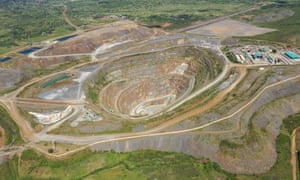Tech firms to check suppliers after mining revelations in Tanzania
Apple says it is ‘deeply committed to responsible sourcing of materials’
Electronics companies, including Canon, Apple and Nokia, are re-evaluating their supply chains following reports they may be using gold extracted from a Tanzanian mine that has been criticised for environmental failures.
Over the past 10 years, at the North Mara goldmine – which is operated by London-listed Acacia Mining – there have been more than a dozen killings of intruding locals by security personnel.
More recently, the Tanzanian government has imposed penalties on the mine and ordered the operators to build an alternative to its tailings reservoir, which is used to store the byproducts of mining.
Nokia and Canon said they would review their supply chains in the light of findings from the Green Blood investigation by the Guardian in collaboration with a collective of journalists led by Forbidden Stories.
Apple said it was “deeply committed to the responsible sourcing of materials that go into its products”.
Under Tanzanian law, no mine should operate within 200 metres of a home or 100 metres of a farm, but Acacia told the Guardian it had not been able to meet this requirement.
The company has built a wall in some areas, improved security training and introduced a grievance mechanism, which have led to a marked reduction in conflict over the past two years, but locals claimed there were still accidents and violence as a result of incursions, and toxic wastewater continued to seep from the mine into residential areas and waterways nearby.
Acacia says it is working to resolve these issues, but meanwhile it is supplying gold to world markets.
Acacia says it sends gold ore from North Mara to refineries in Switzerland and India. The gold is flown directly from an airstrip at North Mara two or three times a month. Passing through a major airport, most likely Dar es Salaam, it then goes to a refinery for processing.
Forbidden Stories has found some of it goes to MMTC-PAMP, a Swiss-Indian venture, which supplies many companies in the tech industry (which use the gold for conductors on circuit boards) and recently partnered with Google Pay.
Contacted by Forbidden Stories, several of these companies said they would review their supply chains.
Nokia said it would contact the refinery and industry regulators. “Based on allegations we have also directly reached out to MMTC-PAMP and are awaiting a response. We will follow up on information received, to determine further action, and if allegations are confirmed, this smelter will be red-flagged and we will ask our supply chain to divert business from this smelter.”
Canon echoed other companies in noting that the MMTC-PAMP smelter had passed the conflict minerals audit conducted by the Responsible Minerals Initiative (RMI).
“We are not aware of any relationship between human rights abuse mining in Tanzania and MMTC-PAMP India. We will carefully review your report after it is published and then consult with the RMI (of which Canon is a member) to take appropriate steps as necessary,” a spokesman said.
Apple said: “If a refiner is unable or unwilling to meet our standards, they will be removed from our supply chain.”
The US company said it had stopped working with 60 refiners and would continue investigating and holding supply chains to the highest standards.
MMTC-PAMP said it conducted due diligence on every supply chain under its responsible precious metals policy, which aims to tackle human rights abuses, conflict, money laundering, terrorist financing and environmental concerns.
In the case of North Mara, the refiner said it was satisfied the mine had taken adequate measures to remediate human rights claims, which were mostly historical and largely related to police operating in the mine. But it recognised that more needed to be done on the environment.
“As part of our ongoing compliance monitoring, we take any new allegation very seriously and immediately contacted the mine to ensure that your allegations refer to known historical facts, except for the recent environmental claim,” said Hitesh Kalia, risk and compliance officer at MMTC-PAMP.
“We have also obtained confirmation from the mine that they are addressing the environmental claim promptly. Finally, it goes without saying that should there be any additional information or allegation that is brought to our attention, we will investigate the same and take the necessary action immediately.”
MMTC-PAMP is certified by the London Bullion Market Association, the most prestigious trade association in the industry.
Yet there are concerns that scrutiny by such bodies focuses on small-scale miners rather than multinationals, that there is not enough attention to environmental standards and local laws, and that responsibility gets diluted along the supply chain.
The Organisation for Economic Cooperation and Development is trying to improve transparency. “Right now responsible sourcing is clearly part of the cost of doing business. It’s part of the commercial need of a company to access markets and financing, among others,” said Tyler Gillard, due diligence expert from the OECD.

沒有留言:
張貼留言